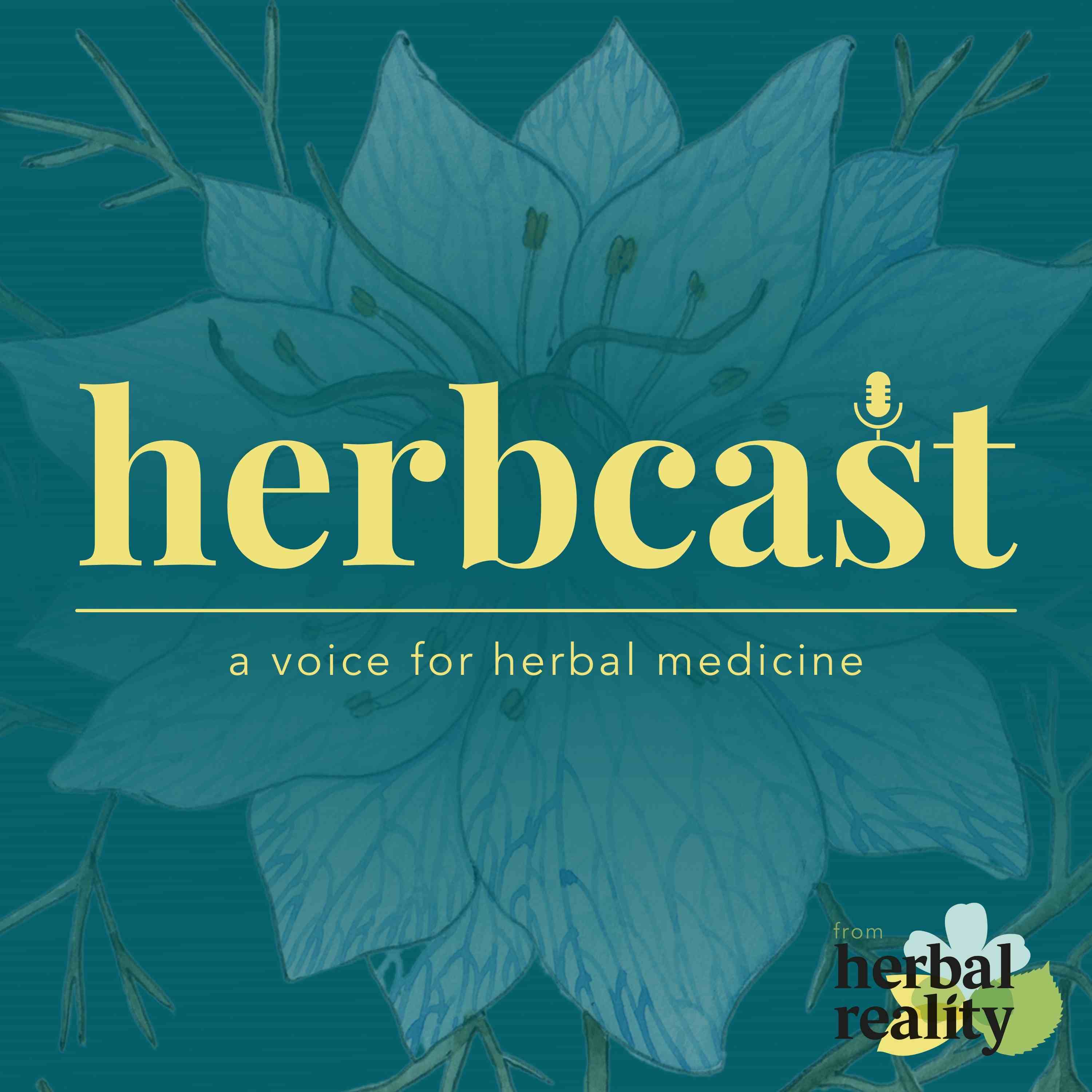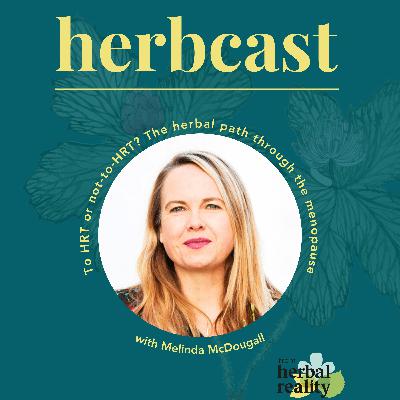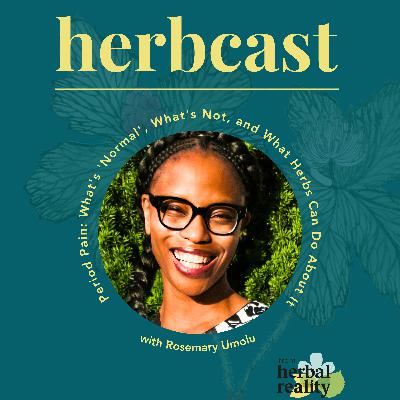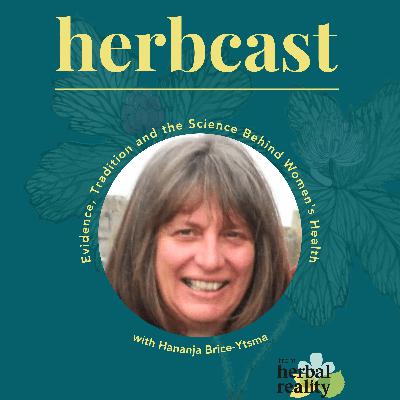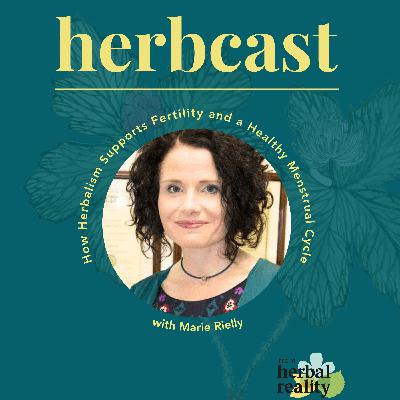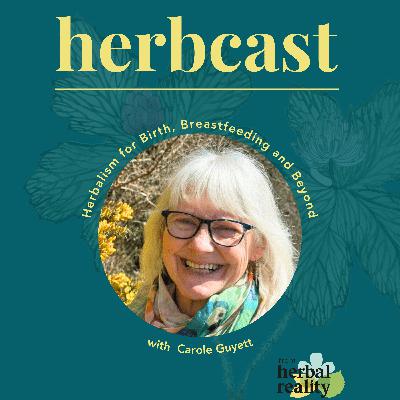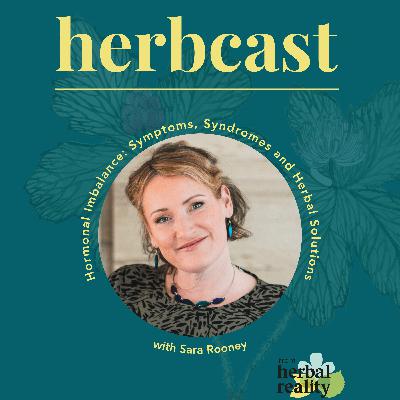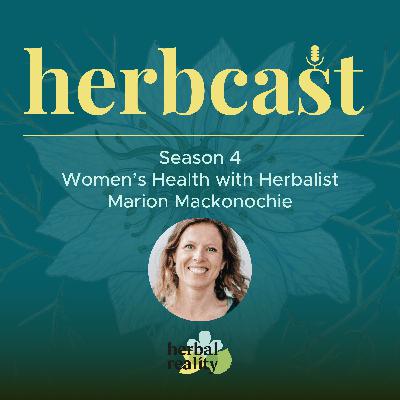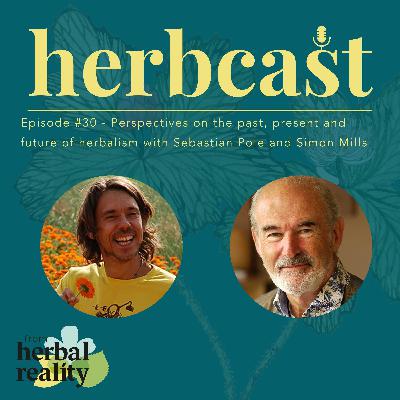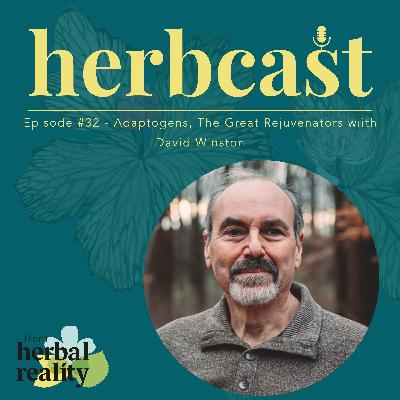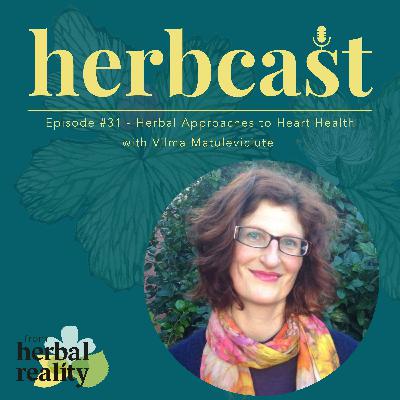Discover Herbcast
Herbcast

Herbcast
Author: Herbal Reality
Subscribed: 92Played: 938Subscribe
Share
© Copyright 2025 Herbal Reality
Description
Delving into the plant-powered world of herbalism.
A podcast for budding herbalist and botanical beginners alike, subscribe to the Herbcast and explore how herbs can be integrated in our every day lives.
Meet some of the world’s most renowned herbalists, here to inspire you to use herbs safely, effectively and sustainably.
Herbcast is a Decibelle Creative original podcast
A podcast for budding herbalist and botanical beginners alike, subscribe to the Herbcast and explore how herbs can be integrated in our every day lives.
Meet some of the world’s most renowned herbalists, here to inspire you to use herbs safely, effectively and sustainably.
Herbcast is a Decibelle Creative original podcast
46 Episodes
Reverse
In this episode of Herbcast, host Marion Mackonochie sits down with Claire Goulding, a medical herbalist and aromatherapist, to discuss the complexities of endometriosis and the natural ways to support those affected by this challenging condition. Claire shares her personal journey with endometriosis, revealing how her own experiences shaped her passion for women's health and herbal medicine.The conversation covers the common symptoms of endometriosis, including debilitating pain, heavy bleeding, and the emotional toll it takes on those who suffer with the condition. Claire emphasises the importance of menstrual cycle awareness and how understanding one's body can empower women in managing their health. She also highlights the significance of personalised herbal treatments, discussing specific herbs that can alleviate symptoms and support overall wellbeing.In this episode:- The role of herbal medicine in pain management and hormonal balance.- Common misconceptions about endometriosis and the latest theories behind its causes.- Practical lifestyle and dietary recommendations to support reproductive health.- Real-life case studies showcasing successful herbal interventions.About Claire:Claire is a Medical Herbalist and Aromatherapist with over 15 years of clinical experience. She works 1:1 with clients both in her private clinic in Bristol and internationally via Napiers Online Clinic.With a strong background in facilitation, education, and environmental conservation, Claire brings a unique and grounded approach to her work. She specialises in hormonal health and is a passionate advocate for menstrual cycle awareness—an essential thread that runs through both her clinical practice and teaching.Claire runs Learn Botanics Herbal Medicine Clinic & Workshops, offering empowering courses and events in Bristol, the South West, and across Europe. She holds a First-Class Honours BSc in Clinical Herbalism.Outside of her practice, you’ll likely find Claire singing in her choir, dancing, or getting out in as much wildness as possible.Follow & Connect:Website: https://www.learnbotanics.co.uk/Instagram: @learn.botanics
In this episode of Herbcast, Nadia Brydon shares with Marion her extensive experience in holistic cancer care, stemming from her personal journey. She discusses the importance of nutrition, emotional support, and various healing modalities in supporting women with cancer. Nadia emphasises the role of hydration, particularly through smoothies and juices, and provides insights into post-chemotherapy nutrition and the use of herbs. She also addresses the significance of healthy fats and the need for simplicity in dietary choices during treatment.In this episode:Nadia's journey into holistic cancer care began with her own cancer diagnosis.Support for cancer patients should include emotional and family involvement.The crucial role of hydration and nutrition in the healing process for cancer patients.Green smoothies and juices for cancer care.Post-chemotherapy nutrition should focus on rebuilding health with whole foods.Fresh oils should be stored and used properly to maintain their health benefits.About Nadia Brydon:MSc. MNIMH. RCHM. Dip Ac. MAR. ANP. BRCPNadia has been a full time multi disciplined Complementary medicine health practitioner for over 35 years following her own diagnosis of cervical cancer. Although having worked mainly in women’s health and with those affected by breast cancer, she is dedicated to helping make a difference in the lives of anyone wanting healing, optimal health, increased energy, longevity and happiness. She is passionate about supporting and guiding plant based therapeutic nutritional changes and teaching how to live closer to the laws of nature believing that nature is our greatest healer and teacher. Nadia has been a lecturer for over 20 years at the College of Naturopathic Medicine (CNM). Previously teaching the CNM Herbal Medicine pathway and now the Natural Chef courses. She currently runs a 3-acre retreat and practice in a 200 year old stone farmhouse in the mountains of the Brecon Beacons National Park welcoming clients to share in the healing beauty, space and peace of living closer to nature away from the noise and stresses of modern living. Connect with Nadia:Website: www.cwmdu-retreat.com Email address: nadia.brydon@gmail.com Explore a world of plant-powered knowledge at herbalreality.com or connect with us on Instagram @herbal.reality.Herbcast is proudly produced by Decibelle Creative / @decibelle_creative
In this episode, Simon Mills engages in a deep conversation with long-time collaborator Chris Etheridge, about the intricacies of herbal medicine and its application in clinical practice. With over two decades of experience, Chris shares his journey into herbalism, inspired by cherished memories of his grandmother's herb garden and a lifelong passion for chemistry.The discussion navigates the challenges and successes of addressing complex health conditions, particularly in oncology and autoimmune diseases. Chris recounts compelling case studies, emphasising the importance of a multi-faceted approach to treatment that combines dietary adjustments, herbal remedies, and patient-centred care. Their insights reveal how herbal medicine can complement conventional treatments, particularly in managing pain and enhancing quality of life.Listen for a deeper understanding of the therapeutic potential of herbs such as wild yam, ginger, and milk thistle, as well as the significance of listening to patients' stories. The conversation also tackles the evolving relationship between herbalists and conventional medical practitioners.More about today’s guest:Chris is a leading advocate for the professional practice of herbal medicine in the UK. He holds a first-class honours BSc and a PhD in Medicinal Chemistry from Imperial College, London. He completed his professional training at the College of Phytotherapy: his dissertation on quality control in herbal medicine was later published. Chris is a practising herbalist in London and Epping, is Chair of the British Herbal Medicine Association and President of both the College of Practitioners of Phytotherapy and the European Herbal Traditional Medicines Practitioners Association. With a background in gene therapy and years of teaching, research, and clinical practice, Chris blends scientific knowledge and practical experience to the benefit of the herbal community.Explore a world of plant-powered knowledge at herbalreality.com or connect with us on Instagram @herbal.realityHerbcast is proudly produced by Decibelle Creative / @decibelle_creative
Ancient Wisdom for Modern Fertility: Chinese Herbal ApproachesIn this episode of Herbcast, we hear the nuances of Traditional Chinese Medicine and how it intersects with modern biomedical practices and women’s health, particularly in the context of pregnancy and fertility challenges. Today’s guest is Naava Carman, traditional Chinese medicine practitioner, experienced fertility herbalist, and founder of The Fertility Support Company.Naava recounts her personal journey into TCM, sparked by her own health struggles as a teenager, which ultimately led her to discover the transformative power of acupuncture and herbal medicine.In this episode:The significance of a personalised approach to fertility treatment, emphasising the need for thorough diagnostics and individualised herbal formulas.How TCM can address common women's health issues, including endometriosis and hormonal imbalances, through targeted herbal interventions.The vital role of male fertility in the conception process and the importance of including male partners in the treatment journey.Nava's insights on the evolving landscape of TCM research and its implications for modern practice.About Naava:Naava Carman has been in practice since 1999 and is an experienced fertility, gynaecological and obstetric acupuncturist and Herbalist specialising in complex autoimmune disorders such as unexplained infertility, recurrent miscarriage, complex issues in pregnancy, PCOS, endometriosis and other inflammatory conditions. She particularly likes to work with people over 40 who have been told there’s no real explanation for their fertility problems other than their age, who have had multiple IVF failures, who are sick of being in charge of all aspects of their journey without a safe person to hold them through it. She has undertaken further specialist training in the area of female pelvic and sexual pain including vulvodynia, dyspareunia and Lichen Planus/Sclerosus. All too frequently, she also works with complex underlying health issues including EBV, Lyme disease, mould toxicity and heavy metal poisoning. Naava loves to work with complex male fertility issues such as day 3 embryo arrest, male hormonal imbalance, varicocele, silent infection, the effects on sperm of altered gut microbiome, normal morphology less than 4%, and poor sperm count and motility.Explore a world of plant-powered knowledge at herbalreality.com or connect with us on Instagram @herbal.reality.Herbcast is proudly produced by Decibelle Creative / @decibelle_creative
In this episode of Herbcast, host Marion Mackonochie engages in a fascinating discussion with Ayurvedic practitioner Kate Siraj about embracing a healthy herbal pregnancy through the lens of Ayurveda. Ayurvedic Practitioner, Shadow Work Facilitator and co-founder of The Ayurveda Academy, Kate Siraj is a fully qualified Ayurvedic Practitioner (BSc Ayurveda, MAPA-B) and has a Master of Chemistry degree from Oxford University, she is the founder of The Ayurveda Practice in Southwest London and co-founder of The Ayurveda Academy. She is a Shadow Work Group Facilitator and Coach and a mother of 3 children. She is passionate about learning and passing on knowledge of Ayurveda and delving into the relationship between emotional and physical health.This episode covers the intricacies of applying Ayurvedic principles to women's health, particularly during fertility and pregnancy. Kate explains how understanding the doshas can empower women to navigate their menstrual cycles, recognising the importance of balance and self-care at each stage. Listeners will learn about the predominant doshas throughout the cycle and how they influence emotional and physical well-being.Kate recounts her experiences with clients, including a remarkable case of a woman with severe endometriosis who successfully conceived after embracing Ayurvedic practices. The discussion highlights the significance of a holistic approach, incorporating diet, herbs, and emotional support, to foster reproductive health.You can expect to discover practical Ayurvedic techniques for enhancing overall well-being, including the benefits of warm water, oil massages, and mindful eating. Kate emphasises the importance of rest, particularly for women, and encourages listeners to reclaim their need for downtime.Explore a world of plant-powered knowledge at herbalreality.com or connect with us on Instagram @herbal.reality.Herbcast is proudly produced by Decibelle Creative / @decibelle_creative
In this episode of Herbcast, host Marion Mackonochie talks with herbalist Melinda McDougall, a specialist in natural menopause support.Together, they navigate the complexities of menopause, addressing the pivotal question: to HRT or not to HRT? Melinda shares her extensive knowledge and experience, providing insights into the holistic approaches available for women undergoing this significant life transition.The conversation explores the current landscape of menopause, highlighting the overwhelming amount of information available and the importance of personalised care. Melinda discusses the diverse experiences women face during menopause and the various herbal remedies that can support them, including the well-researched black cohosh, adaptogens like ashwagandha, and the nourishing properties of Shatavari and maca root.This episode aims to empower women with knowledge and options, encouraging them to embrace this transition with confidence and support.Join us for this enlightening conversation that bridges traditional herbal wisdom with modern understanding, offering a roadmap for navigating menopause naturally.Explore a world of plant-powered knowledge at herbalreality.com or connect with us on Instagram @herbal.reality.Herbcast is proudly produced by Decibelle Creative / @decibelle_creative
Period Pain: What's 'Normal', What's Not, and What Herbs Can Do About It In this episode of Herbcast, Marion Mackonochie talks with herbalist Rosemary Umolu, who is dedicated to supporting women through the complexities of menstruation, pregnancy, and childbirth. Together, they explore the often-overlooked topic of period pain, distinguishing between what is considered normal and what might indicate a deeper issue, such as endometriosis or fibroids.Rosemary shares her unique journey into herbalism, highlighting her passion for using nature's remedies to alleviate period pain and other reproductive health challenges. She discusses the importance of educating young women about their menstrual health, including her impactful Periods Not Pills campaign aimed at providing alternatives to hormonal treatments.Listeners will discover:- The dietary changes that can significantly alleviate period pain, including the role of magnesium and the importance of reducing sugar intake.- How specific herbs, like cinnamon and chamomile, can provide relief during menstruation and support overall reproductive health.- Practical insights on recognising when period pain may be symptomatic of more serious conditions, and the importance of seeking help.- Rosemary's holistic approach to women’s health, emphasising the need for self-awareness and empowerment in managing menstrual health.About RosemaryRosemary Umolu is a Midwife, Herbalist and speaker passionate about supporting women through periods, pregnancy and birth. After becoming a medical herbalist, she set up House of Rosemary, helping women get rid of periods pains and common conditions such as endometriosis, PCOS and fibroids. After overcoming issues with her own periods during her twenties, she became fascinated and passionate about educating teens and women about how to have a healthy menstrual cycle. As part of her journey in women's health, she went on to become a midwife, supporting women to have a holistic pregnancy and give birth feeling confident. She offers different services helping women to take charge of their health and have a positive understanding of their body.House of Rosemary website: https://houseofrosemary.com/Social media: https://www.instagram.com/houseofrosemary/Explore a world of plant-powered knowledge at herbalreality.com or connect with us on Instagram @herbal.reality.For articles relating to women's health visit: https://www.herbalreality.com/insights/health-lifestyle/women-health/Herbcast is proudly produced by Decibelle Creative / @decibelle_creative
In this episode of Herbcast, host Marion Mackonochie welcomes esteemed herbalist Hananja Brice-Ytsma, a fellow of the National Institute of Medical Herbalists with over 35 years of experience. Together, they talk about the intricate relationship between herbal medicine and women's health, exploring the evidence, tradition, and empirical knowledge surrounding this vital field.The conversation highlights the current state of research on women's health, with a particular focus on menopause, polycystic ovary syndrome (PCOS), and fibroids. Hananja shares her insights on the evolution of understanding these conditions, revealing the gaps in knowledge that still exist despite advancements in research. They discuss the significant role of herbs like black cohosh and Vitex Agnus castus, examining their mechanisms of action and the complexities of herbal efficacy.This episode offers insights into how traditional herbal practices intersect with modern scientific research, as well as the importance of a holistic approach to women's health. The episode also touches on the challenges of researching herbal medicine, the impact of diet and lifestyle, and the empowering role of herbalists in guiding women through their health journeys.This episode is a must-listen for anyone interested in the evolving landscape of women's health and the potential of herbal medicine to provide support and healing.Explore a world of plant-powered knowledge at herbalreality.com or connect with us on Instagram @herbal.reality.Herbcast is proudly produced by Decibelle Creative / @decibelle_creative
In this episode of Herbcast, host Marion Mackonochie welcomes esteemed herbalist Marie Reilly, who brings over 20 years of experience in medical herbalism to the table. With a rich background that includes a master's degree focused on female functional infertility, Marie shares her insights on how herbal medicine can effectively support reproductive health.The conversation delves into the myriad of reproductive health conditions that can benefit from herbal intervention, from PMS and endometriosis to fertility challenges. Marie discusses the limitations of orthodox medicine in addressing these issues and highlights the surprising effectiveness of herbal treatments, often with fewer side effects.You will hear about:- The importance of a holistic approach to diagnosing and treating reproductive health issues.- How lifestyle factors and nutrition can influence fertility and menstrual cycles.- The role of herbal remedies in addressing hormonal imbalances and conditions like endometriosis.- Insights into the connection between autoimmune conditions and fertility challenges.Marie also emphasizes the significance of thorough consultations in herbal practice, which allow for a deeper understanding of individual health needs. By combining traditional wisdom with modern science, this episode provides a comprehensive look at how herbal medicine can empower individuals on their journey to reproductive health.Join us for this engaging discussion and discover how you can harness the power of herbs to support a healthy cycle.Marie Reilly has over 20 years experience as a Medical Herbalist. She qualified from the College of Phytotherapy having conducted her undergraduate research dissertation on the use of Herbs in the treatment of Chronic Fatigue Syndrome (CFS/ME). She subsequently completed the Scottish School of Herbal Medicine Masters Degree Programme, after completing research on the treatment of female functional infertility with herbal medicine. She has also studied Endobiogenic Medicine with Dr. Jean Claude Lapraz, and Ayurveda with Dr. Vasant Lad, and is the author of Herbal Medicine and Reproductive Health.Marie previously taught on the BSc Herbal Sciences course at Cork Institute of Technology. She currently teaches on the practitioner training courses at The Plant Medicine School in Cork, Excelsior in Belfast, and Betonica in the UK, and regularly supervises training clinics for students from various courses in the UK and Ireland. She has lectured at the Cork Institute of Technology Herbal Science Symposium; at Botanica 2014 (Trinity College Dublin); the National Institute of Medical Herbalists Annual Conference; Power of Plants festival; and Herbfeast Ireland. She also regularly provides numerous CPD seminars on various subjects for practitioners of herbal medicine.In the past, she has appeared on RTE’s “Health Squad” and “The Afternoon Show”, on various programmes for WLRfm, and has been interviewed for various National Newspapers in Ireland and the UK. She continues to write a weekly health column in the Dungarvan Leader, and to provide talks and demonstrations for local groups.Marie is also a qualified Emergency First Responder, and works in conjunction with a Medical Doctor and Paramedic, to provide emergency first aid in the local community as part of the Lismore Community First Response Team, a voluntary service.Explore a world of plant-powered knowledge at herbalreality.com or connect with us on Instagram @herbal.reality.Herbcast is proudly produced by Decibelle Creative /
In this episode of Herbcast, host Marion Mackonochie converses with experienced herbalist Carole Guyett, who has been immersed in the field since 1987. Together, they discuss the essential role of herbal medicine in supporting women through the transformative journeys of birth and breastfeeding.Carole imparts her extensive expertise in assisting women during pregnancy, childbirth, and the postpartum period. Drawing from her wealth of experience, she highlights the significance of herbal support during labour, featuring customised birthing packs filled with beneficial herbs such as mugwort, raspberry leaf, and soothing tinctures for pain relief and relaxation.The discussion also covers the dynamics of working alongside midwives and the evolving role of doulas, as well as the often-overlooked importance of postnatal care in contemporary society. Carole underscores the necessity for herbal tonics and practical support to facilitate recovery for new mothers, emphasising the importance of addressing both physical and emotional well-being.Listeners will discover herbal remedies for common postpartum challenges, including mastitis and hormonal imbalances, while also learning about the advantages of herbs like Vitex and astragalus for breastfeeding support. With a focus on empowerment and education, this episode serves as a valuable resource for anyone interested in the intersection of herbalism and women's health.Carole Guyett MNIMH trained at the School of Herbal Medicine in Tunbridge Wells, UK and has been a practising medical herbalist since 1987. She has worked extensively in the areas of fertility, pregnancy, and birthing, and as a teacher of obstetrics and gynaecology to herbal students and practitioners. Carole is passionate about the importance of the continuing safe practice of herbal medicine for childbearing women and the generations to come. She is author of The Herbalist’s Guide to Pregnancy, Childbirth and Beyond (pub. Aeon Books 2022) and Sacred Plant Initiations (pub. Inner Traditions 2015). Carole lives in Ireland where she offers apprenticeships, workshops and ceremony.Join us for this discussion that not only celebrates the wonders of motherhood but also highlights the vital role of herbal medicine in nurturing women's health journeys.Explore a world of plant-powered knowledge at herbalreality.com or connect with us on Instagram @herbal.reality.Herbcast is proudly produced by Decibelle Creative / @decibelle_creative
In this episode of Herbcast, host Marion Mackonochie engages in a compelling discussion with medical herbalist Sara Rooney, who specialises in women's health. Together, they explore the intricate world of hormone balance, shedding light on how understanding our hormonal cycles can empower women to optimise their health.Sara delves into the vital roles hormones play in our daily lives, emphasising the importance of recognising their fluctuations throughout the menstrual cycle. From the energising effects of oestrogen during the follicular phase to the calming influence of progesterone in the luteal phase, the conversation highlights how these hormonal shifts can impact mood, energy levels, and overall well-being.The duo discusses practical strategies for managing hormone health, including dietary recommendations tailored to different phases of the cycle and the role of herbs like maca and Vitex Agnus castus in supporting hormonal balance. Sara shares her insights on common conditions such as polycystic ovarian syndrome (PCOS) and endometriosis, advocating for a holistic approach that combines nutrition, stress management, and herbal support.As they navigate the challenges women face in accessing effective healthcare, Sara calls for a greater understanding of women's health issues within conventional medicine, stressing the need for holistic solutions that empower women to take charge of their hormonal health.Join us for an enlightening conversation that promises to deepen your understanding of herbal medicine and its potential to support women's health. For more articles on this topic, visit our section on women's health.Explore a world of plant-powered knowledge at herbalreality.com or connect with us on Instagram @herbal.reality.Herbcast is proudly produced by Decibelle Creative / @decibelle_creative
Herbal Solutions for Women's Health - Series 4 Coming Soon!Get ready for an exciting new series of Herbcast, where we turn our focus to women's health and the vital role herbal medicine plays throughout the stages of a woman's life. Introducing your brand new host for series 4, the brilliant Marion Mackonochie, a clinical herbalist and herbal medicine researcher, who will be guiding us through this enlightening journey.Marion, a familiar voice from series 3 when Marion was a Herbcast guest, now brings her extensive expertise to the other side of the microphone, exploring with more fascinating guests how traditional plant wisdom and contemporary scientific research can enhance women's health. This series will cover an array of essential topics, including:Effective treatments for period painInsights into complex conditions like PCOS and endometriosisHerbal solutions for infertility and healthy pregnanciesSupporting women through menopause As we navigate the menopause, Marion will engage with experts to discuss natural support options, addressing the pivotal question: to HRT or not to HRT? Additionally, we'll delve into supportive approaches for women undergoing cancer care, enriched by perspectives from Ayurvedic and Chinese medicine.Each episode will be rooted in clinical experience and traditional knowledge, offering as always a well-rounded view of how herbal medicine can empower women at every stage. Plus, expect a few special episodes featuring Sebastian and Simon Mills, as they continue to highlight the enduring potential of herbs in promoting human health generally.Whether you're a practitioner, a plant enthusiast, or simply curious, join us for Series 4 of Herbcast, launching in the summer of 2025!In the meantime…Subscribe to Herbcast now to ensure you don’t miss a single episode, and connect with us on social media for the latest updates. Explore a world of plant-powered knowledge, and discover a wealth of free resources including recipes, health quiz, and research-backed information on our website herbalreality.com or connect with us on Instagram @herbal.reality.Herbcast is proudly produced by Decibelle Creative / @decibelle_creative
**Correction to the discussion on degree courses: there is one still running at Lincoln College**.Join us for an enlightening discussion with seasoned herbalists Simon Mills and Sebastian Pole as they delve into the evolving landscape of herbal medicine and its integration into modern healthcare. This episode tackles the critical question: why isn't herbalism more mainstream, despite its proven benefits and growing demand?Simon and Sebastian reflect on their extensive experiences in the field, exploring the historical and cultural barriers that have kept herbal medicine on the fringes of mainstream healthcare. They discuss the rigorous training and deep scientific knowledge required to become a herbalist, and why this expertise is often overlooked by conventional medical systems.The conversation covers the challenges and opportunities facing herbal practitioners today, from regulatory hurdles to the booming herbal supplement industry. The duo also highlights the unique therapeutic gaps that herbal medicine can fill, particularly in chronic health conditions where modern medicine falls short.Looking to the future, Simon and Sebastian share their vision for a more integrated healthcare system that embraces the power of plants. They discuss the importance of quality control in herbal products, the potential of herbalism to address the ageing population's needs, and the critical role of community and collaboration in advancing the field.Discover how herbalism can contribute to a sustainable healthcare model that not only promotes individual well-being but also respects and preserves our natural environment. With a call to action for the next generation of herbalists, this episode is a rallying cry for unity and progress in the herbal community.Explore a world of plant-powered knowledge at herbalreality.com or connect with us on Instagram @herbal.reality.Herbcast is proudly produced by Decibelle Creative / @decibelle_creative
Adaptogens: The great rejuvenators with David WinstonIn this episode, Sebastian welcomes renowned herbalist and educator David Winston, whose five decades of experience span herbal traditions from North America to Asia. David, a founder of the American Herbalist Guild and author of *Adaptogens: Herbs for Strength, Stamina, and Stress Relief*, offers a deep dive into the fascinating world of adaptogens. He traces their origins back to Soviet research in the mid-20th century when scientists were searching for substances to enhance resilience against stress. Unlike many herbal remedies rooted in traditional practices, adaptogens emerged from a modern scientific framework. David provides a detailed explanation of what defines an adaptogen, emphasizing their specific effects on the body’s stress response systems, including the HPA axis and SAS. He shares insights into various adaptogens, such as ginseng, ashwagandha, and schisandra, highlighting their unique properties and suitability for different individuals and health conditions. The conversation also touches on the importance of sustainability, with David stressing the need for responsible cultivation and use of adaptogenic herbs like rhodiola and cordyceps, which face ecological pressures.Drawing from his clinical experience, David offers practical guidance on how to integrate adaptogens into a holistic health regimen. He underscores the importance of rigour and precision in herbal practice, advocating for evidence-based approaches to maximize the benefits of these powerful herbs. Whether you’re a seasoned practitioner or new to herbal medicine, this episode provides a wealth of knowledge on how adaptogens can support physical and emotional well-being in today’s high-stress world.Explore a world of plant-powered knowledge at herbalreality.com or connect with us on Instagram @herbal.reality.Herbcast is proudly produced by Decibelle Creative / @decibelle_creative
Join us as we cross the Irish Sea to delve into the heart of herbal practice with Vilma Matuleviciute, a seasoned herbalist and naturopath based in Ireland. With over two decades of experience, Vilma shares her insights on the multifaceted approach to heart health, combining the physiological with the emotional.In this enlightening episode, we explore the unique challenges of practising herbalism in Ireland, including the impact of Brexit on herb supplies. Vilma discusses the importance of listening deeply to patients, understanding their emotional and mental landscapes, and tailoring herbal treatments to suit individual needs.Discover how herbs like hawthorn, motherwort, and Angelica sinensis play a role in supporting cardiovascular health, and learn about the significance of dietary changes and emotional well-being in managing heart conditions. Vilma also highlights the use of adaptogens and nervines to address stress and anxiety, particularly in post-menopausal women.Whether you're a budding herbalist or a seasoned practitioner, this episode offers valuable insights into the holistic approach to heart health, emphasising the interconnectedness of body, mind, and spirit.Explore a world of plant-powered knowledge at herbalreality.com or connect with us on Instagram @herbal.reality.Herbcast is proudly produced by Decibelle Creative / @decibelle_creative
Herbs for Colds and Fevers: The Diaphoretics with Dr. Amparo AracilIn this episode, we explore how diaphoretic herbs can boost immunity and help manage seasonal infections. Discover how these herbs regulate body temperature, improve circulation, and support the body's immune response.With extensive training and practice, Dr. Aracil blends herbal and medical expertise. Their holistic approach combines traditional herbal wisdom with modern medical insights, making them a respected voice in integrative medicine.Dr. Aracil explains how the body responds to infections, detailing the role of fever and the immune system's mechanisms. Learn about the benefits of diaphoretic herbs like yarrow, peppermint, ginger, and elderflower, which help manage fever and have anti-inflammatory and antibacterial properties. They also discuss the importance of tailoring herbal treatments to individual needs and balancing acute and chronic conditions.Discover the use of herbs like echinacea, thyme, and lemon balm in both acute and chronic scenarios, and learn how mushrooms like reishi and cordyceps support respiratory health and overall vitality. Dr. Aracil's insights into the synergistic nature of herbs provide a comprehensive guide for enhancing your health naturally.Explore a world of plant-powered knowledge at herbalreality.com or connect with us on Instagram @herbal.reality.Herbcast is proudly produced by Decibelle Creative / @decibelle_creative
Enter the world of bitter herbs, and learn about their historical significance and modern-day applications with expert herbalist Guido Masé. As a renowned herbalist, gardener, and educator, Guido shares his extensive knowledge of how bitters can enhance digestion, regulate appetite, and support metabolic health.Guido Masé RH(AHG) is a clinical herbalist, educator, and garden steward specialising in holistic Western herbalism with an eclectic approach. Born in Italy, he has lived in Vermont since 1996. He is a founder and faculty member at the Vermont Center for Integrative Herbalism and serves as the herbalist, principal scientist, and chief formulator at Traditional Medicinals. He is also a founding member of the Burlington Herb Clinic and participates in herbal education at the University of Vermont. Author of The Wild Medicine Solution and DIY Bitters, Guido's teaching integrates clinical experience, storytelling, and scientific research, emphasising the connection between humans and nature for sustainable living.In this episode, discover the fascinating mechanisms behind how bitters work in the body, from stimulating digestive secretions to modulating hormonal responses. Learn about the evolutionary role of bitter taste receptors and their presence not just in the mouth, but throughout the gastrointestinal tract and even within the heart and lungs. Guido explains how bitters can help with common digestive issues like gas, bloating, and heartburn, as well as more serious conditions such as type 2 diabetes and metabolic syndrome.Guido and Sebastian also delve into the importance of dosing and the energetic qualities of bitters and explore the concept of hormesis, the paradoxical effect where small doses of potentially harmful substances can strengthen the body. Explore a world of plant-powered knowledge at herbalreality.com or connect with us on Instagram @herbal.realityHerbcast is proudly produced by Decibelle Creative / @decibelle_creative
Ever wondered how herbs can influence your mood and stress levels? We explore the world of nervines, nootropics, and sedatives with the esteemed Julian Barker. A seasoned herbalist and philosopher, Julian shares his vast knowledge of how these herbs can help manage emotions, memory, and cognitive function.Julian Barker taught in England and France before becoming a theatrical and literary agent in the 1960s. He botanised and studied herbal medicine in the USA and Central America for four years. Returning to England, he apprenticed at Suffolk Herbs, managed Hulbrook House Herbs, and studied with NIMH. A graduate of the Full-Time School of Herbal Medicine, he wrote The Medicinal Flora of Britain & NW Europe and founded a Student Training Clinic in Brighton. Since 1998, he has collaborated with Dr. Jean-Claude Lapraz and translated La Médicine Personalisée. He taught herbal medicine at the University of East London, contributing to a textbook. Barker continues to work full-time in Sussex, with recent books on his herbal medicine approach. Blending his clinical expertise with a philosophical approach to herbal medicine and numerous books to his name, Julian has become a respected figure in the herbal community, known for his deep understanding of the interconnectedness of plants and human health.In this episode, Julian challenges the conventional categories of nervines and nootropics, offering a nuanced view of how herbs can support emotional and cognitive health. He explores the concept of somatopsychic effects, where treating physical symptoms can alleviate emotional distress, and vice versa. Julian also discusses the importance of understanding an individual's terrain—the unique neuroendocrine and emotional landscape shaped from prenatal stages through to adulthood.Explore a world of plant-powered knowledge at herbalreality.com or connect with us on Instagram @herbal.realityHerbcast is proudly produced by Decibelle Creative / @decibelle_creative
Have you ever stopped to appreciate the simple act of breathing? Each inhale brings life-giving oxygen into our bodies, but what happens when this effortless process becomes a struggle? In this episode Ramana Zahn reminds us that healing is a holistic journey that requires us to look at the body as an interconnected system.About Rumana: A Clinic Director and Consultant Naturopath, ND, BSc (Hons), DipCK, DipA, DipM, CEd, FAMH, MGNC. Rumana began her career as a microbiologist specialising in food and water analysis before transitioning to the chemical and pharmaceutical industries. She eventually redirected her focus towards holistic health, blending scientific principles with traditional medicines. Trained in naturopathy, herbal medicine, homoeopathy, acupuncture, kinesiology, iridology, and yoga, she offers comprehensive health programs that incorporate these disciplines alongside body assessments. Passionate about helping others, Rumana teaches at universities, runs clinics, and conducts research, including collaborations with the University of Newcastle. She also engages in Argentine tango, philosophy, yoga, and meditation. As a respected member of various professional associations and a prolific writer and lecturer, she actively contributes to advancing holistic healthcare practices.Ramana takes us through the intricacies of respiratory health, a topic that has gained immense importance in the wake of global health challenges. She shares her insights on how the lungs are not just organs of breath but are deeply connected to our joy and life force. When they function well, we feel alive and vibrant; when they don't, our entire being suffers. Rumana emphasises the importance of an integrated approach to health, combining herbal remedies with breathwork and lifestyle changes. She discusses how the health of your gut can have a profound impact on your respiratory system and delves into the herbal toolbox, sharing specific formulas that have worked wonders for her patients. From the anti-inflammatory properties of sweet wormwood to the soothing effects of liquorice root.Explore a world of plant-powered knowledge at herbalreality.com or connect with us on Instagram @herbal.reality.Herbcast is proudly produced by Decibelle Creative / @decibelle_creative
Revealing the secrets of botanical medicine in treating urinary and kidney health, Dr. Sally Moorcroft discusses the vital link between the gut microbiome and urinary function. Hear real-life success stories of patients finding relief from chronic conditions through herbal interventions.About Sally: Integrative and function doctor. MBChB, BSc(Hons), MCPP, MFHom(Med). Clinical Lead Dr. Moorcroft has 20 years of clinical experience and is one of the most highly trained Integrative and Functional Medicine doctors in the UK. She is also a Core Tutor at the National Centre of Integrated Medicine in Bristol (NCIM).Combining functional and nutritional medicine, herbal medicine, homeopathy, bio-identical hormone and natural desiccated thyroid therapy in her clinic. She has a special interest in women's health, menopause, gut health and psychology.Her qualifications include a BSc (Hons) in Herbal Medicine, Medical Homeopathy (MFHom) through the National Centre for Integrative Medicine, Bristol. She is also trained in Traditional Chinese Medicine, Medical Acupuncture and Bio-Identical Hormone Therapy and Natural Desiccated Thyroid therapy.This episode delves into the often overlooked area of urinary and kidney health which affects a significant portion of the population. Dr. Moorcroft sheds light on the intricate ways in which our gut microbiome, hormonal balance, and even our stress levels can impact these vital organs.Also, Sally explores estrogen dominance and its ramifications on women's well-being, especially throughout the menopausal phase. Dr. Moorcroft elucidates her method of addressing these hormonal fluctuations through a blend of herbal remedies and dietary adjustments.Explore a world of plant-powered knowledge at herbalreality.com or connect with us on Instagram @herbal.reality.Herbcast is proudly produced by Decibelle Creative / @decibelle_creative


